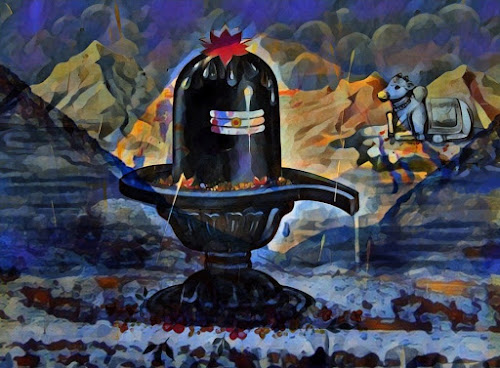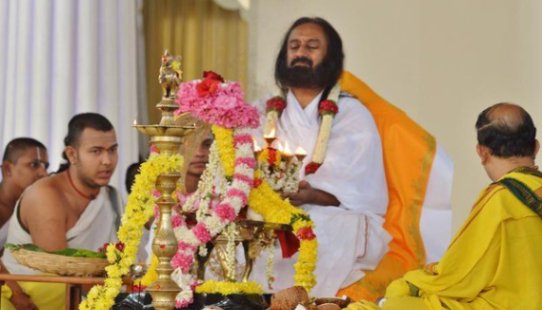https://www.youtube.com/watch?v=lHN3C_RqXOU&feature=youtu.be
2020年6月23日星期二
Rudra Sharavan Masa Puja
https://www.youtube.com/watch?v=lHN3C_RqXOU&feature=youtu.be
2020年6月22日星期一
希瓦原則 Shiva Principle
The Shiva Tattva - By Sri Sri
凡事都會來,凡事都得以維持,一切也都消溶於其中。希瓦是空間,它是意識。您甚至不可能隨時退出希瓦Shiva,因為Shiva是整個創造界的總和。這就是為什麼希瓦的身體被描繪成藍色的原因,
沒有形狀,無處不在的無限。
那是希瓦。
一種永恆的生命狀態,
是唯一的一,
-是希瓦。
There is no way that you can even step out of Shiva at anytime because Shiva is the summum bonum of the whole creation. That is why Shiva’s body is depicted in blue because blue signifies the sky; the all pervading infinity which has no limits, and no shape.
The permanent and eternal source of energy, the eternal state of being, the one and only one – is Shiva.”
一切都是希瓦
Rudrabhishekam的意思是要傳達一切都是希瓦,
且包含在希瓦像中。無希瓦以外。
醒著的、休眠的或睡著的–也是希瓦原則Shiva Tattva。
「 Namo jyeshthaaya cha kanishthaya cha。
Namo dhundhubhyaya cha hananyaya cha」。
這意味著「 向最大和最小的那個(希瓦)致敬。
「Vanchate parivanchate sthayunaam-pataye namo namaha」。
「 Namo vrikshebhyo Harikeshebhyo pashunaam pataye namo Namaha」。
意思是「希瓦!您是所有植物,植被和所有生物的至高神性和主」。
因此,這意味著希瓦是永恆的神性,在創造中所有的人事物中無處不在。
我祈禱你能掩飾你的恐懼形式,並以你令人愉快的仁慈形式祝福我。”
「 Shancha-me,Mayascha-me,Priyancha-me,
Anukamascha-me,Kamascha-me…」。
我們向您致意禮敬;一次又一次」。
我們祈禱在生命中獲得和平和愛。我們還祈禱我們得到生命中所有有利和美好的事物。
我們要求兩者:物質慾望的滿足Bhukti(布克提)和靈性解脫Mukti( 穆克提)。
「 Maanastoketanaye ma-na ayushhi ma-no goshhu ma-no ashveshu ririshhah。
Viranma-no rudra bhamitoavadhi‘rhavishhmanto namasa vidhema te」。
(Rudram Chanting中Namakam的第10節)。
願我們的動物健康安全。
請從您的可怕的形式Ghora Rupa中拯救眾生。
rudrabhishekam-meaning-shiva/
星期一,梵誦,心智和月球之間的聯繫!
特音,心智,月亮,它們都連接在某個地方。
因此,在印度,作為一種傳統,他們在靜心所中誦經。
也因此,在我們的靜心所中,每個星期一都有儒珈禮讚Rudra Pooja。
因此,無論大自然給了我們什麼,火,水,香,水果,鮮花,米,
讚誦進行持續時,這些物品都被使用了。它具有深度和意義。
您可以去做一些研究,結果將會越來越多。
Rudram chanting done on Mondays is even more special. Monday is the day of the moon and the moon and mind are connected. Mantra, mind, moon, they are all connected somewhere. So, in India, as a tradition, they have this chanting going on in the Ashrams. So in our ashram also, every Monday, we have Rudra Pooja.
All the five elements are used in pooja. Pooja means honoring all the elements, born out of fullness. So, fire, water, incense sticks, fruits, flowers, rice, whatever nature has given to us, those things are used and the chanting goes on. There is a lot of depth and meaning to it. You can go and do some research on it, more and more things will come out.
Rudram是一種古老的誦經,是從空間(Aakasha)下載的。 當古老的聖賢和先知Rishis坐著靜心時,他們聽到了,他們將聽到的開始傳遞給其他人。
Rudram的作用是產生正能量並消除負面振波。關於Rudram的說法很多。
當Rudram發生時,自然蓬勃發展,自然變得喜悅和快樂。
主要是,它會產生更多的正離子,人們在冥想時也會產生更多的正離子。 僅將其作為一種儀式並沒有那麼有效,因為據說:當人們從內在覺醒時,吠陀得誦經是很具效力的。
對他們而言,這些梵音具有更多的意義。
因此,他們可以幫助您深靜心。
Rudram is an ancient chanting which was downloaded from the Aakasha (space). When the ancient sages and Rishis sat in meditation, they heard, and what they heard, they started transferring to other people.
The effect of Rudram is it creates positive energy and removes negative vibes. And a lot is said about the Rudram. When Rudram happens nature flourishes, nature becomes joyful and happy.
Mainly, it creates more positive ions, more so when people are meditating. Just doing it as a ritual is not that effective because it is said that:
The Veda Mantras are effective when people are awake from within.For them, these mantras have more meaning. So, they help you to go deep into meditation.
connection-monday-mantra-mind-moon/( 原文連結)
https://www.youtube.com/watch?time_continue=5&v=QjsO4UVwsow&feature=emb_logo
2020年6月20日星期六
Rudrabhishek或Rudra Puja 儒珈禮讚的意義
Significance of Rudrabhishek or Rudra Puja
關於Rudrabhishek的說法很多。當Rudrabishek發生時,自然蓬勃發展,自然變得快樂,幸福。
Mind心智這一英文字自梵語「Mana」法力。
天真無邪的神性;那就是一切。
為什麼我們說「Namo納莫,Namo納莫!」’
它都是相同的原則。
據說當人們從內在覺醒時,吠陀唱頌是具有效力的。
對他們而言,這些特音具有更多的意義。
因此,它們可以幫助您深入靜心。
Rudrabhishek is an ancient chanting which was downloaded from the Aakasha (space). When the ancient sages and Rishis sat in meditation, they heard, and what they heard, they started transferring to other people.
A great principle by which everything is made of, they called it Bramhan. And when thatBramhan becomes personal, it is called Shiva Tattva – the innocent Divinity; that is in everything. That is why we say, ‘Namo, namo!’
‘Abhayanchame’, fearlessness, happiness, health, all the good things in the universe, let them all come to me, and they are all part of me. That is it.
Or you allow a string of water to keep falling on a crystal and you listen to this chanting – this is the ancient method.
significance-rudrabhishek-rudra-puja/ ( 原文出處的連結)
http://www.srisriwisdom.org/index.php/TW/daily-satsang-tc/4390-wssstd-beopenminded-tc
2025 navaratri
Day1 hindi to English FM89.9 https://www.youtube.com/watch?v=mMEv_Ipa6IQ Day2 ( maba maba maba Bo) https://www.youtube.com/watch?v=_qk2mlp...
-
哈努曼Hanuman甚麼都不想,只想服務羅摩王子Ram。 有一天,哈努曼(Hanuman)問西塔Sita為什麼她用紅點朱砂點在她的額頭眉心上。她告訴他,這是她熱愛羅摩Ram的的標誌。哈努曼得出結論說,朱紅色代表著虔敬奉獻者與神之間的化學反應(愛的精華Rasayan)。哈...
-
古儒吉( 若威香卡)Sri Sri Ravi Shankar 說: 「 權力對於那些是為了個人利益而使用它的人來說是毒藥 」 。靈性指引對所有人來說都是如此重要,對那 被賦予權力的人更是。當一個人的覺知擴展,能從更廣闊的視野來看待生命時,不動心自然就會產生,權力就可以被用來有...
-
When the five elements governed by Lord Shiva ( Pancha Mahabuta- Earth, water, Fire , Air and Eter) unites with Shakti( pure Consciousne...







